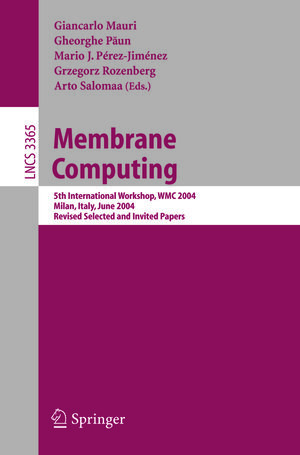
×
![Buchcover ISBN 9783540318378]()
Membrane Computing
5th International Workshop, WMC 2004, Milan, Italy, June 14-16, 2004, Revised Selected and Invited Papers
herausgegeben von Giancarlo Mauri, Gheorghe Paun, Mario J. Pérez-Jiménez, Grzegorz Rozenberg und Arto SalomaaInhaltsverzeichnis
- Invited Lectures.
- ? P Systems and Typed ?-Calculus.
- P Automata.
- Asynchronous P Systems and P Systems Working in the Sequential Mode.
- Evolution and Oscillation in P Systems: Applications to Biological Phenomena.
- An Approach to Computational Complexity in Membrane Computing.
- LMNtal: A Language Model with Links and Membranes.
- Regular Presentations.
- Executable Specifications of P Systems.
- On the Efficiency of P Systems with Active Membranes and Two Polarizations.
- Communicative P Systems with Minimal Cooperation.
- Ultimately Confluent Rewriting Systems. Parallel Multiset–Rewriting with Permitting or Forbidding Contexts.
- Unstable P Systems: Applications to Linguistics.
- A P System Description of the Sodium-Potassium Pump.
- Inhibiting/De-inhibiting Rules in P Systems.
- Time–Independent P Systems.
- On Two-Dimensional Mesh Networks and Their Simulation with P Systems.
- Exploring Computation Trees Associated with P Systems.
- Approximating Non-discrete P Systems.
- Reducing the Size of Extended Gemmating P Systems.
- P Systems Generating Trees.
- On Descriptive Complexity of P Systems.
- P Systems with Symport/Antiport: The Traces of RBCs.
- Conservative Computations in Energy–Based P Systems.
- General Multi-fuzzy Sets and Fuzzy Membrane Systems.
- Trading Polarization for Bi-stable Catalysts in P Systems with Active Membranes.
- Modelling Dynamic Organization of Biology-Inspired Multi-agent Systems with Communicating X-Machines and Population P Systems.
- On the Size of P Systems with Minimal Symport/Antiport.



